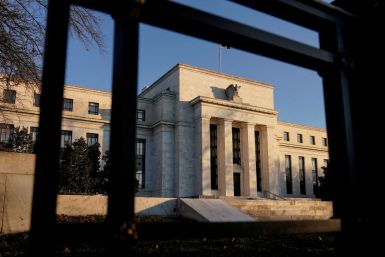Countries that are seeking advantage by failing to condemn Russia's "heinous war" against Ukraine are being short-sighted and will face consequences if they undermine Western sanctions, U.S.
The International Monetary Fund hopes to mobilize around $45 billion for a new trust to help a broader range of countries, including some middle-income economies, deal with climate change and other longer-term challenges, a paper prepared by IMF staff and reviewed by Reuters shows.
The International Monetary Fund's executive board on Wednesday approved creation of a new facility to help low-income and most middle-income countries deal with longer-term challenges such as climate change and pandemics.
Bank of Japan Governor Haruhiko Kuroda on Wednesday warned the recent rise in inflation driven by higher import costs could hurt the economy, stressing the central bank's resolve to keep monetary policy ultra-loose.
Gold prices edged higher on Wednesday as concerns of an escalation in the Russia-Ukraine conflict increased safe-haven bids for the precious metal, although a firmer U.S.
Global investor optimism lifted shares on Wednesday despite blurry inflation forecasts as bank earnings and oil supply concerns boosted trading sentiment.
Asian shares and U.S. futures rose on Wednesday as U.S. inflation figures were not as high as markets had feared, causing U.S. yields to pause their march higher.
Global shares were little changed on Wednesday, pausing after a six-day slump amid a mixed inflation picture, while supply concerns after Russia's ongoing invasion of Ukraine helped push oil prices higher.
Global shares traded up on Wednesday after a six-day slump amid investor optimism despite blurry inflation forecasts, while supply concerns following Russia's invasion of Ukraine helped push oil prices higher.
Taiwan central bank governor Yang Chin-long said on Wednesday inflation would slow by the third quarter and any rate rise decisions would depend on consumer price data, but the bank would be very cautious on the pace of tightening.
The Japanese yen weakened past the 126 yen per dollar mark on Wednesday for the first time since 2002, while the euro was pinned at a one-month low as investors bought the U.S.
The U.S. dollar soared to a nearly 20-year high against a sluggish yen on Wednesday, as aggressive tightening from the Federal Reserve contrasted sharply with the Bank of Japan's ultra-loose monetary policy.
The U.S. dollar eased back from a nearly two-year high on Wednesday as the euro reversed course and turned positive ahead of a policy-setting meeting at the European Central Bank on Thursday.
The euro was pinned to a five-week low on Wednesday and commodity currencies found support as prospects for peace in Ukraine darkened, while traders were bracing for volatility in the New Zealand dollar ahead of an expected rate hike.
The Japanese yen weakened past the 126 yen per dollar mark on Wednesday for the first time since 2002 while the euro was pinned at a one-month low as investors flocked to the U.S.
The Port of Los Angeles, the nation's busiest, on Tuesday reported record first-quarter volume as anxiety builds ahead of the July 1 expiration of the labor contract covering some 22,000 West Coast dock workers.
Countries around the world are working to diversify their supply chains and reduce their dependence on China, which is "probably good for everyone," World Bank President David Malpass said on Tuesday.
Argentina's central bank directors will meet on Wednesday to discuss a possible interest rate hike, a source with the bank told Reuters on Tuesday, as the South American country battles annual inflation expected to have topped 6% in March.
U.S. consumer inflation hit another four-decade high in March when it reached 8.5% in large part on gasoline prices surging to a record, but the data sported enough soft spots for some Wall Street pundits to declare "peak inflation" was at hand.
Gold advanced more than 1% on Tuesday as Treasury yields eased after U.S.
The COVID-19 pandemic wreaked havoc on global supply chains but new International Monetary Fund research shows that more diversification of source countries and inputs can significantly reduce the economic drag from supply disruptions.
OPEC on Tuesday cut its forecast for growth in world oil demand in 2022 citing the impact of Russia's invasion of Ukraine, rising inflation as crude prices soar and the resurgence of the Omicron coronavirus variant in China.
OPEC on Tuesday cut its forecast for growth in world oil demand in 2022 citing the impact of Russia's invasion of Ukraine, rising inflation as crude prices soar and the resurgence of the Omicron coronavirus variant in China.
U.S. monthly consumer prices increased by the most in 16-1/2 years in March as Russia's war against Ukraine boosted the cost of gasoline to record highs, cementing the case for a 50 basis points interest rate hike from the Federal Reserve next month.
Prices for online goods continued to surge in March at a record pace, data released on Tuesday from Adobe Inc showed, adding a potentially troubling dimension to the Federal Reserve's battle to slow the overall pace of price increases.
The Nasdaq led Wall Street's main indexes higher on Tuesday after data showed consumer prices rose largely in line with estimates, taking pressure off high-growth stocks that were hammered on expectations of aggressive U.S.
The Nasdaq led the charge on Wall Street on Tuesday after data showed inflation rose largely in line with estimates, lifting growth stocks that were hammered by a surge in Treasury yields on expectations of aggressive U.S.
Wall Street edged lower on Tuesday, reversing earlier gains as Treasury yields rebounded and once again pulled growth stocks back into red territory.
Canada's biggest banks started fiscal 2022 on a hiring spree, adding staff despite a tight labour market, especially to boost digital capabilities.
South Korea's finance minister will lobby for the country to be included in the Morgan Stanley Capital International (MSCI) developed market index when he meets the index provider next week, he said on Tuesday.



































